Nigerian cuisine; Jollof Rice
Nigerian cooking comprises of dishes or food items from the hundreds of diverse ethnic gatherings that make up Nigeria. Like other West African foods , it utilizes flavors and herbs with palm or groundnut oil to make profoundly enhanced sauces and soups. Nigerian galas are beautiful and extravagant, while fragrant market and roadside snacks cooked on grills or browned in oil are abundant and of various types. 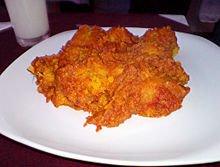
Coconut rice is a meal prepared by drenching white rice in coconut milk or cooking it with coconut chips. As both the coconut and the rice-plant are ordinarily found in the tropics all-around the globe, coconut rice too is found in many societies all through the world, crossing over the equator from Southeast Asia to the Caribbean.
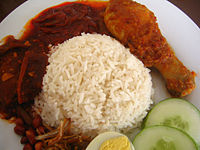
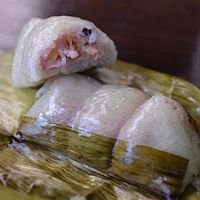
Jollof rice is a well-known dish in Western Africa, eaten all through the areas of Nigeria, Ghana, Senegal, Gambia, Sierra Leone, Liberia, Ivory Coast, Togo, Cameroon and Mali. There are a few territorial varieties in name and ingredients. The name Jollof rice gotten from the name of the Wolof communities, however in Senegal and Gambia the dish is alluded to in Wolof as theibou dienne or benachin. In French-speaking territories, it is called riz au gras. In spite of the varieties, the dish is "commonly coherent" across the locale, and has spread alongside the diaspora to wind up as the best known African dish outside the continent.
In view of its name, the roots of Jollof rice can be followed to the Senegambian locale that was governed by the Jolof Empire. Food and horticulture student of history James C. McCann considers this claim conceivable given the notoriety of rice in the upper Niger valley, yet thinks of it as far-fetched that the dish could have spread from Senegal to its present range since such a dissemination isn't seen in "etymological, recorded or political examples". Rather he recommends that the dish spread with the Mali domain , particularly the Djula tradespeople who scattered broadly to the local business and urban focuses, taking with them economic specialties of "blacksmithing, small scale marketing, and rice agronomy" and in addition the religion of Islam.
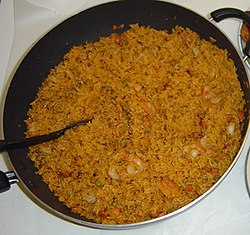
Nigerian and Ghanian debate
For a better understanding of Ghanaian jollof rice, one needs to realize that the rice utilized is not quite the same as the Nigerian one. Their inclination is Thai Jasmine-a perfumed more dull rice which we call "basmati". The normal Ghanaian can't stand the long grain rice Nigerians eat. They say it's not sweet and the grains are excessively fat.(It's a thing). Ghanaians love hot spicy food. The more peppery, the better it tasted. So the jollof rice is frequently taken with "shito" – a peppery sleek sauce produced using onions, shrimp, ginger and peppers served in little plastic compartments. "Shito" is awesome and there are a few general stores in Nigeria that offer jugs of "shito". It can be used to eat everything – bread, yam, chips e.t.c. Any Ghanaian jollof rice that is unaccompanied by shito is not complete.
There are two types of Jollof rice in Nigeria: the normal home cooked one, which is pleasant; and the "Party Jollof rice" which is epic. Party jollof rice is in its very own league – that amazing smoky taste is unbelievable. Cooking immaculate party jollof rice is an art to be taught/learned. I trust it's the kindling smoke and the consuming of the rice in the cast press pot that gives it that indefinable taste. The new school party jollof rice cooked at parties with gas cooker isn't the same – aside from the cook is extraordinarily skilled. Jollof rice cooked the Nigerian way is quite awesome. A few people parboil it, some don't. Some include green peas and sweet corn. There is local jollof rice made with palm oil or palm nut extricate.
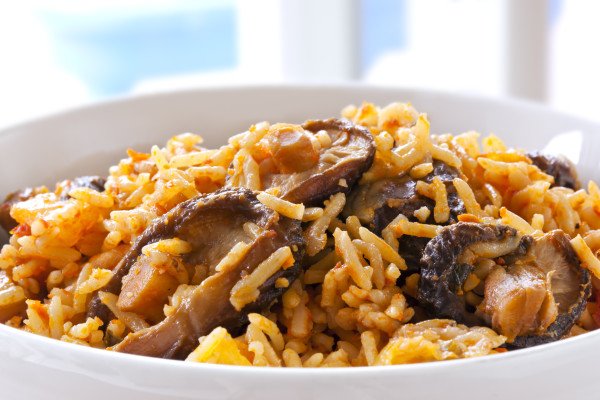
Let me wax philosophical and say that what we see at play here is deeper than a fantastic dish. It could be the ever irrepressible Nigerian superiority complex and the typical African/Ghanaian view that Nigerians are aggressive and think they know all. We all have our prejudices and I am not about to go into all that; but the truth is the take of both countries on jollof rice are great, and every one should be proud of their take on the dish and not start an insultfest .
In my humble opinion, there are no winners between Nigerian and Ghanian jollof. They are both amazing, really.
Food and subsequently taste is subjective, our tastes can’t always correlate, that would be weird. Let there be peace, please.
yummy
Congratulations @gaoloy! You have completed some achievement on Steemit and have been rewarded with new badge(s) :
Click on any badge to view your own Board of Honor on SteemitBoard.
For more information about SteemitBoard, click here
If you no longer want to receive notifications, reply to this comment with the word
STOP